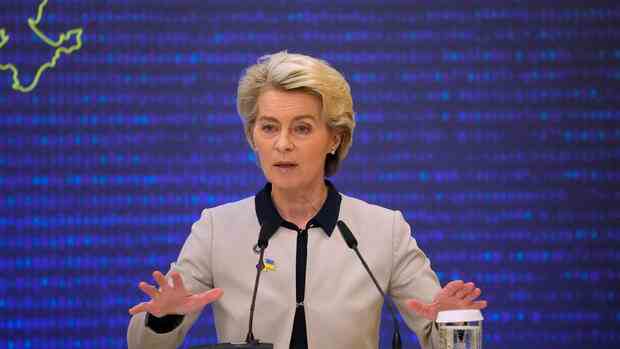The head of the EU Commission wants to make the EU more independent of China and the USA.
(Photo: AP)
Brussels EU Commission chief Ursula von der Leyen has presented the European heads of state and government with new details on her industrial plan. Accordingly, the Commission wants to relax state aid law by 2025 in order to enable the targeted promotion of sustainable technologies. In the medium term, she wants to set up a sovereignty fund that will also promote investments in artificial intelligence, quantum computers and biotech.
According to the Commission, the “Green Deal Industrial Plan” is necessary to reduce dependence on China for green technology, to offset the US government’s cleantech subsidies and to ensure Europe’s long-term competitiveness.
At the EU summit in Brussels on Thursday, von der Leyen gave a presentation that illustrated her concept. The industrial plan consists of four pillars. First: a reliable and simplified regulatory environment. Second: faster access to finance. Third: the training of workers. And fourth, open trade relationships to build stable supply chains.
In recent weeks, von der Leyen’s industrial plan has been discussed primarily as a response to the US green subsidy program. Concerns about China in Brussels are even greater. In the circle of EU leaders, von der Leyen presented a diagram according to which China accounts for between fifty and almost 100 percent of the production capacity for critical goods such as solar cells, wind turbines, heat pumps and electric car batteries. If this continues, the energy transition will lead Europe from dependence on Russia to dependence on China.
>> Read also: Interview with Christian Lindner: “We cannot be blackmailed”
To prevent this, the EU wants to simplify the rules for the construction of solar parks, wind power plants and battery factories and speed up the approval process. At the same time, Brussels is planning to improve Europe’s supply of important raw materials such as lithium, copper and rare earths. To this end, the Commission intends to present the “Raw Materials Act” in the next few weeks, a law that is intended, among other things, to improve domestic production and increase the recycling rate.
Von der Leyen is aware that not all member states can afford expensive industrial policy interventions. So that there is no unfair competition within Europe, she wants to make short-term aid available from various funding sources to countries that are cash-strapped.
Up to 270 billion euros are in the “RePowerEU” program for clean energy projects, she calculated. With “InvestEU”, the EU can assume investment guarantees of 26 billion euros. And the “Innovation Fund” includes a further 40 billion euros, which could be accessed within the next ten years.
“In the medium term,” explained the head of the Commission, the EU needs another instrument, the “European Sovereignty Fund”, which is intended to promote investments in future-oriented industries. In addition to cleantech, von der Leyen also cited artificial intelligence, quantum computers and biotechnology as examples.
More: Billions for cleantech companies: EU proposes new investment fund
